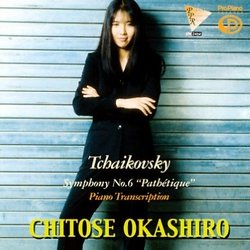Niemann's and Okashiro's Pianistic Vision of the 'Pathetique
Hexameron | 10/30/2006
(5 out of 5 stars)
"Many classical listeners have their favorite recordings of Tchaikovsky's 'Pathetique' Symphony. How many would be willing to hear Tchaikovsky's final musical utterance on the medium of the piano? As a passionate pianophile, I think my review will move other pianophiles, pianists, and those who savor unusual arrangements. But my greatest task is to convince the most stalwart Tchaikovsky fans who cling to their Abbado, Toscanini, Furtwangler, and Karajan etc. that the present solo piano performance is an equal tour-de-force.
The piano is clearly a miraculously powerful and versatile instrument. It is capable of emulating the nuances, dynamics, and thick sound of the orchestra while suggesting instrumental colors. Expert transcribers and arrangers can do wonders to clarify and capture orchestral, vocal, or chamber textures on the piano. This is evident in the innovative piano transcriptions of Liszt, Busoni, Godowsky, and even the craftsmanship of Brahms's four-hand arrangements. A lesser-known arranger was Walter Niemann (1876-1953), a very minor composer in the late 19th and early 20th-century. I cannot think of anything he transcribed other than Bach, but his solo piano arrangement of Tchaikovsky's Sixth Symphony is an astounding specimen. It's designed not for educational purposes, but for the veteran piano virtuoso.
Chitose Okashiro tackles the challenges of Niemann's transcription, but reworks his arrangement even further. Like Cyprien Katsaris with Liszt's Beethoven transcriptions, Okashiro thickens the textures, adds extra doublings, altered notes, and achieves a stunning work of art that is wholly pianistic. Okashiro has a difficult interpretative task at hand: she must not only convey every bar of pathos and angst with appropriate emotional attachment, she must handle all of the taxing passages and technical feats of this virtuosic transcription.
In the first "Adagio - Allegro" movement, Okashiro compensates well for the lack of orchestral volume and color. Since she cannot imitate the timbre of the surging woodwinds and moaning wails of the strings, Okashiro relies on gradations of shading, dynamics, scalar figurations, and tremoli. Even without the orchestra, Okashiro's performance is texturally dense, forceful, and still in command of Tchaikovsky's voicing. Perhaps most phenomenal is Okashiro's execution of the brutally intense and enraged development section. Here Okashiro plays the role of piano virtuoso as hero and artist: menacing tremolandi, rip-roaring figurations, and smashing chords abound; the piano is simply ablaze under her fingers. Okashiro moves smoothly through the second "Allegro con grazia" movement, which despite its bizarre 5/4 time, sounds like a riveting piece of music Tchaikovsky might have written for solo piano.
Even the frolicking and busy third "Allegro molto vivace" movement sounds fresh and marvelous without the orchestra. Okashiro is a fantastic technician and is able to play the rapid filigree with lightness while making chordal punctuations in accordance with Tchaikovsky's wonderful march theme. I don't think anyone could object to what Okashiro accomplishes in the dismally bleak last "Adagio lamentoso" movement. As a pianist, I marvel at her mastery of dynamic control. As a Tchaikovsky fan, I also believe her tempo and interpretation is the best I've heard from any performer(s). Somehow a single pianist evinces more gut-wrenching despair and pain from this epic threnody, Tchaikovsky's true Requiem, with more subtleties of expression than any conductor I've heard.
Bottom line: The present CD is too marginalized to make a large impact on the discography, but I believe a giant step in the art of transcription has been achieved. More than that, Okashiro demonstrates that she has the heart of a poet. Few composers have expressed their bare naked soul and musically depicted such weeping and anguish like Tchaikovsky. Okashiro may not have the swells of an orchestra on her side, but she communicates Tchaikovsky's agony with more genuine feeling than any orchestral version I've heard."
A new sensation of Tchaikovsky performance
Hexameron | 02/15/2003
(5 out of 5 stars)
"Master of Piano Transcription Performance would probably be Cyprien Katsaris. Then there are several other one-offs, such as Glenn Gould, Paul Badura-Skoda etc. Chitose Okashiro is widening her repertoire so as not to be a one-off transcription performer, but this Tchaikovsky performance can stand all by itself, be it one-off or not.
You would at first think this performance was created with multi-track recording. I made an enquiry to her office, and confirmed that this is not at all the case. It is genuinely a real-time solo recording. This is surprising considering the solid harmony, agile phrases and close-to-orchestra tempi of this performance.
It's a new sensation of Tchaikovsky performance - it's worth the money you pay."


 Track Listings (4) - Disc #1
Track Listings (4) - Disc #1